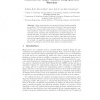Free Online Productivity Tools
i2Speak
i2Symbol
i2OCR
iTex2Img
iWeb2Print
iWeb2Shot
i2Type
iPdf2Split
iPdf2Merge
i2Bopomofo
i2Arabic
i2Style
i2Image
i2PDF
iLatex2Rtf
Sci2ools
117
click to vote
MICCAI
2005
Springer
2005
Springer
Multiscale 3D Shape Analysis Using Spherical Wavelets
Shape priors attempt to represent biological variations within a population. When variations are global, Principal Component Analysis (PCA) can be used to learn major modes of variation, even from a limited training set. However, when significant local variations exist, PCA typically cannot represent such variations from a small training set. To address this issue, we present a novel algorithm that learns shape variations from data at multiple scales and locations using spherical wavelets and spectral graph partitioning. Our results show that when the training set is small, our algorithm significantly improves the approximation of shapes in a testing set over PCA, which tends to oversmooth data.
Biological Variations | Medical Imaging | MICCAI 2005 | Shape Variations | Significant Local Variations |
Related Content
| Added | 15 Nov 2009 |
| Updated | 15 Nov 2009 |
| Type | Conference |
| Year | 2005 |
| Where | MICCAI |
| Authors | Delphine Nain, Steven Haker, Aaron F. Bobick, Allen Tannenbaum |
Comments (0)

